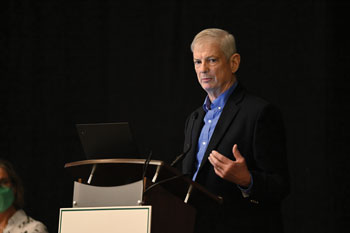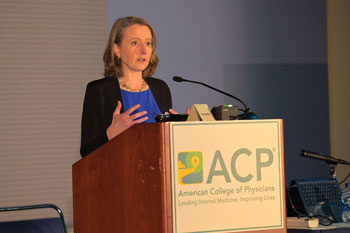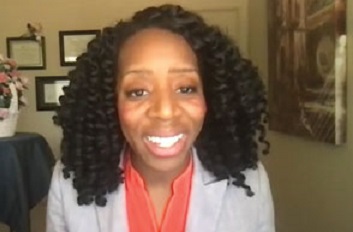A farewell perspective after 4 decades of advocacy
ACP's Special Advisor to the Chief Advocacy Officer and SVP Emeritus reflects on forty years of pursuing social justice and equity.
After more than 43 years of being an advocate for internal medicine, I will retire on Aug. 1.
My journey began when I was hired by the American Society of Internal Medicine (ASIM) on Jan. 22, 1979, just a few months out of college with a degree in political science, hoping to land somewhere where my passion for political activism could take root and grow. ASIM taught me the skills to translate passion into action and results.

When ACP and ASIM merged on July 1, 1998, I was asked to head up the newly combined Washington advocacy staff. This was the start of the most rewarding yet challenging phase of my career, bringing together what began as a team of rivals to create what became the medical profession's most respected advocacy and public policy team. Like all that I helped achieve, I did not do it by myself; it took enlightened governance and staff colleagues to build a culture of learning from each other so we could all do better. This culture continues.
But to really understand my ACP career, let me take you back to September 1926, the year my father, Jack Doherty, was born in a thatched cottage, with no indoor plumbing or electricity, in the small town of Drumshanbo, County Leitrim, Ireland. While still an infant, he emigrated with his father and mother to New York City. But for reasons I do not fully understand, my father, when he was just two, returned to Ireland with only my grandmother. My grandfather stayed behind and later opened up a neighborhood bar in Woodside, Queens, New York, while my grandmother raised and supported my dad while living on a subsistence Irish farm. They did not hear from my grandfather until he wrote them eight years later to ask them to join him again in New York. They once again crossed the Atlantic in steerage.
The next few years were tumultuous for my dad, living in a crowded tenement with a father he did not know and did not get along with, sharing a bed with an uncle, in a country that was strange and not particularly welcoming to a poor country Irish kid. His father died suddenly when my dad was only 16. His mom then ran Doherty's Bar until my dad took it over at age 18, tending bar 60 hours a week. Doherty's Bar financially supported my mom, my three sisters, and me through the 1970s, giving us a middle-class lifestyle. During summer breaks from college, I was the third generation of Doherty men to work behind the bar. The dock workers, police officers, firefighters, and carpenters who were my dad's customers gave me a perspective on the lives of working-class people that I never would have known as a sheltered suburban kid.
My father, with only a high school education, decided to enroll in college and got a BA in history, then a master's degree in secondary education, all while still working behind and managing the bar. He sold Doherty's Bar in 1978 and became a New York public school teacher for mostly poor African American and Haitian immigrants in Brooklyn. He would explain that he became a teacher to help kids who, like himself, grew up poor and were made to feel unwanted and unwelcomed.
What does any of this have to do with my career at ACP? My dad's example inspired me to want to try to make things better for others, especially for those who have been made to feel unwanted and unwelcomed. It has made me a grateful advocate for immigration, which is what has really made America great. My sisters and me, the children of a poor immigrant, have had successful careers as a regional and off-Broadway costume designer, a U.S. ambassador to Cyprus, a social worker who has dedicated her life to children in need, and, yes, a health policy advocate.
ACP is the place where I've been able to act on my passion for social justice and equity. Among our shared achievements that matter most to me are enactment of the Affordable Care Act, which extended coverage and patient protections to millions; our leadership in advocating for fair and compassionate immigration policies; our New Vision for the U.S. Health Care System, which when realized would make coverage and care affordable for everyone; our commitment to confronting the existential threat of climate change; our courage in taking on the epidemic of gun violence and the NRA that enables it; and our pledge to stand up for diversity, equity, and inclusion, especially our recent policy framework for challenging and overcoming racial and ethnic discrimination and disparities in care. I am proud of ACP's work to support its members with better payment, better and fewer performance measures, less paperwork, and better EHRs. Internal medicine physicians are the best and they deserve the best.
My greatest and saddest disappointment is that despite ACP's leadership in advocating for policies to eliminate preventable injuries and deaths from firearms, “more Americans died of gun-related injuries in 2020 than in any other year on record,” according to a February 2022 analysis by the Pew Research Center based on CDC data. Mass shootings occur almost daily, and sometimes several times a day. The Washington Post recently interviewed me after children and teachers were massacred in Texas and I observed, “We thought after Sandy Hook, that after you saw elementary schoolchildren massacred just like what you saw [yesterday], the country would do something. We couldn't even get a modest step to close some of the loopholes in our background check system.” The Post's Health 202 called it the quote of the week. I wish it didn't have to be said.
Looking to the future, I believe ACP's not yet fully realized agenda of preserving the patient-physician relationship, ensuring health equity, challenging racism and discrimination, preventing gun violence, achieving universal coverage, preserving reproductive health and rights, and mitigating climate change, among others, will face enormous challenges at the state and federal levels. There is no one better than my colleague and friend, Shari M. Erickson, MPH, ACP's new (as of March) Chief Advocacy Officer, to lead ACP staff in these trying times.
The Athenian statesman Pericles is said to have remarked, ‘‘What you leave behind is not what is engraved on stone monuments, but what is woven into the lives of others.” Nothing is woven more into the lives of others than their health and the health of their loved ones. I leave ACP knowing that I did my part to improve the lives of others, and I am confident that ACP will continue to make lives better in the future.
Farewell and thank you.




